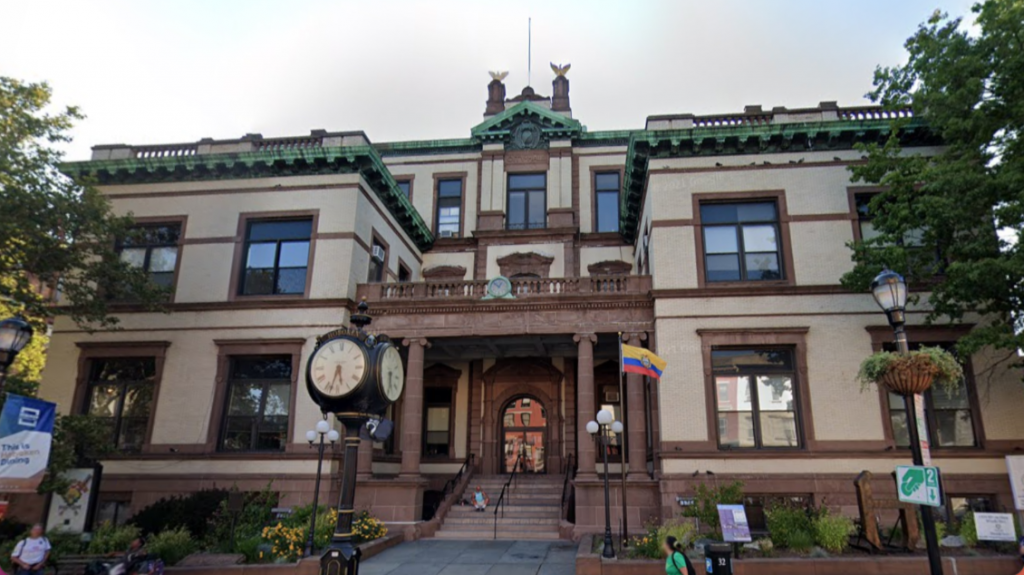The Hoboken City Council will consider amending their pay-to-play rules to raise the local union donation limit from $500 under their stringent rules to $7,200, which is permitted under state guidelines.

By John Heinis/Hudson County View
During the tail end of the 2019 ward council elections, Council-at-Large members Jim Doyle and Emily Jabbour repeatedly introduced a non-binding resolution asking for the council to support the enforcement of the city’s pay-to-play rules.
The measure never received a vote and came about a month after outside counsel recommended the Mile Square City repeal their pay-to-play laws, which they never did.
Now, Jabbour is sponsoring an ordinance with 5th Ward Councilman Phil Cohen, who was a candidate in 2019, that would amend the rules for unions.
“This was an issue that came up in the [2019] campaign: I was annoyed that the city council couldn’t take the stance that the pay-to-play rules should be enforced. At the time, Councilman DeFusco was raising boat loads of money from the unions. He was stressing that he was following state rules and the local rules were unenforceable,” Cohen said over the phone.
“I’ve got good working relationships with the unions that worked on this campaign and they’ve got a first amendment right to participate in the process: I don’t see a problem. I think unions have an important role in democracy, I don’t think it’s tainting the process. Having unions represent workers and workers’ right is something I really care about.”
He added that the $500 limit would remain in place for developers and PACs. Just prior to the 2019 elections, City Clerk Jimmy Farina filed a complaint against DeFusco alleging he violated the city’s pay-to-play rules that remains unresolved.
This election cycle, Mayor Ravi Bhalla, who ran unopposed, and his council slate of Doyle, Jabbour, and first time candidate Joe Quintero received endorsements from big labor unions such as SEIU 32BJ and the Hotel Trades Council.
Hoboken’s pay-to-play rules are among the most strict in the state and were adopted under Bhalla’s predecessor, Mayor Dawn Zimmer, about a decade ago when he served as a councilman-at-large.
According to Council President Ruben Ramos, who unsuccessfully challenged Zimmer in 2013, this is typical political hijinks from this administration.
“To the victor goes the spoils. It’s certainly reversing a lot of what the Zimmer administration tried to implement for a number of years: let’s see what happens Wednesday evening on first reading,” Council President Ruben Ramos said.
2nd Ward Councilwoman Tiffanie Fisher also blasted the ordinance for essentially the same reasons, along with the fact that the majority of the union contracts are still up in the air.
“Wasn’t the crux of the Zimmer era reform movement to curtail influencing campaign contributions and limit outside money into Hoboken’s local elections?,” she began.
“You have to ask why Mayor Bhalla and Councilmembers Jabbour and Cohen what to undo these good government policies and support quid pro quo politics again that only favor elected officials interests over Hoboken residents and taxpayers. There is always a trade – and I see the shakedown of our five city employee unions who have been without a contract for four years in the near future.”
City spokeswoman Marilyn Baer said that repealing this one aspect of pay-to-play would no longer curtail union participation in local elections.
“The City of Hoboken’s more restrictive campaign finance ordinance was originally crafted to curtail the influence of PAC’s in local elections, but it had the unintended consequence of curtailing local union participation,” she wrote in an email.
“This amendment would simply correct that and allow unions to financially contribute during elections as allowed under New Jersey State law. The ordinance is being introduced now to allow ample time for future candidates to familiarize themselves with the change ahead of future elections.”
If approved on first reading on Wednesday, the second reading of the measure would go before the council on December 15th.